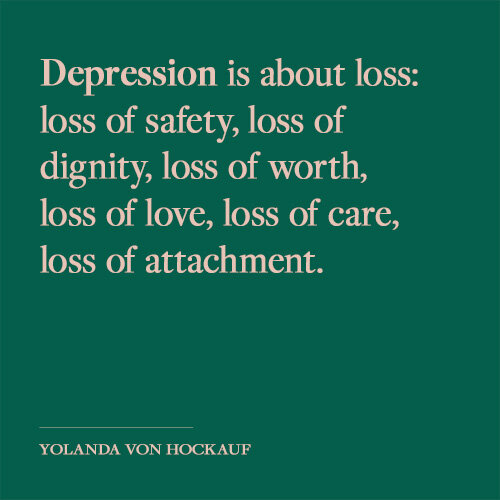"Experiences from couples therapy": How do we deal with depression in our relationships? An interview with couples therapist Yolanda von Hockauf
Depression is one of the most common mental health problems nowadays. Depression affects not only our personal well-being, but also impacts our relationships. We and our partners might fight because of the evolving sadness, helplessness and loss of stability. How can we help and support each other in times of depression and what does depression have to do with attachment and connection?
How do we deal with depression in our relationship? Pin this article now and read later!
In this interview Yolanda von Hockauf, Certified Trainer in Emotionally Focused Therapy (EFT), gives answers to questions around depression and relationships. Yolanda has worked with this model since 1983 - being one of the therapists in Sue Johnson's first EFT study. She is also a founding director of the Vancouver Couple & Family Institute (VCFI), which has gained a reputation of excellence in the therapeutic community among physicians, other therapists and the general public for therapy, supervision and training in EFT.
If you or your beloved feel blue, you find insightful perspectives and knowledge around depression in this interview. If you are a therapist, I have two recommendations for you. First, have a look at the full-interview. Yolanda shares her most favourite interventions and gives you important insights into working with depression in couples therapy. Second, she will go more into detail in her online workshops about the “EFT Tango” on the 11th -12th of September 2020 and Emotionally Focused Individual Therapy (EFIT) on four Fridays, starting on 18th of September 2020. Yolanda is a trainer for 20 years and held workshops in so many countries (Just to name a few European Countries: Finland, Netherlands, Croatia, Bulgaria, Italy and Belgium) I personally can't wait to learn from this warmhearted, intelligent and experienced therapist.
Hello Yolanda, as Corona and quarantine is still so present, what would you tell your younger self that lived right before Corona?
Yolanda von Hockauf: I would definitely tell that younger self to give more time, to slow it down and to take care of myself and consider reworking my lifestyle a little bit: to travel less, to maybe start my day a little later and to do something for myself. What is the point in rushing? There are more important things than being out there all the time. My most important connections are right here where I am.
Slowing down is also such an important part in Emotionally Focused Therapy. Why is it so helpful?
Yolanda von Hockauf: Slowing down is important, because we can’t notice things - even about ourselves – if we rush. Our brain just jumps so quickly into our actions. So slowing it down is such a lovely way to track our own process and be aware of it. And how can we change anything that we’re not aware of?
To slow down is not an individual process. We are creatures of attachment. We become co-regulated by others from the moment we are born, and we learn so much about our worth, our value, what we’re allowed to be or not be. For me slowing down is about security with ourselves and with others. Slowing down allows me to listen to my signals on the inside and to share them and connect with others. I’m always thinking about the internal and the interpersonal.
And connection gives us courage. It takes courage to go into those dark scary places, those unfamiliar places. Sue has a beautiful word for it: Frightening, alien, unacceptable emotions. We can’t go there alone, we need a therapist or another attachment figure who grounds us, who stays with us, and helps us face those things, because we can’t do it on our own.
You said something about attachment and there might be readers who don’t know what you mean. How do you describe it?
Yolanda von Hockauf: I have clients who ask me about reading material and of course I give them material. But inside myself I smile because attachment is not something you can just read. You need to experience it. We have to grab people's hearts, not just their heads. The way we help our clients to understand attachment, is by giving them a felt sense of what it is. We as therapists are that other that make space for them to start and access who they are. But we don’t just do that. We also help them to zoom out and make meaning of what they’re experiencing. We help them feel safe to be who they are.
Sue Johnson developed her model of Emotionally Focused Therapy (EFT) by tracking and tracing what happens with couples as they make changes. In 1982/83 the manual was just 20 pages long and today there are so many more books and studies. EFT is about a deep sense of existential and wired in need to be connected and safe in this world. Because we can’t do it alone as mammals.
What would you love people think about eft? If people think about eft what words should come to their minds?
Yolanda von Hockauf: Emotionally Focused Therapy is deeply humanistic, parsimonious - in the way Sue uses it - meaning efficient and gets you where you need to get, moving very moving. And it is so nonpathologizing.
You already mentioned negative emotions and so it would be interesting to talk about depression. How do EFT and EFIT (Emotionally Focused Individual Therapy) see depression?
Yolanda von Hockauf: Depression is a huge presenting issue in our individual clients, couples and families. Depression and anxiety are almost universal in mental health distress and they often occur together and can be treated together. Depression, I feel, is the hallmark of mental health distress. When I view depression through the attachment lens, it becomes so clear what we can do with it.
Depression is about loss: loss of safety, loss of dignity, loss of worth, loss of love, loss of care, loss of attachment. Clients feel unloved and helpless. Their sense of agency, that they can reach for what they need in the world and will receive it, has been taken away from them. So they get into a feedback loop of learned helplessness, perhaps unworthiness, and it becomes too difficult for them to reach to get their needs met – if not impossible. They’ve learned to view themselves as unlovable, and to view others as neglectful, hurtful or harmful. And when they feel unworthy and helpless, it is so hard to get out of that feedback loop which creates more depression and isolation. People struggling with depression often feel a lot of shame. They feel ashamed, maybe around being broken, and not being as good as other people. They might lie in bed in the morning not able to get out of bed because they believe this world is a very rejecting world or that there is no place for them.
We as therapists have to be not afraid of what we call negative emotions and avoid it. We can help our clients go into these negative emotions: the pain of rejection, the pain of feeling not good enough, the loss, and sadness of it. And then we can help to process all that and to find that other, compassionate part that says: “Wait a minute, it’s true, I got really put down a lot. I was told, I was broken. That was back then, and it’s very sad to this day. And I’m starting to realize, this is very sad and upsetting for me. I deserve better.” We all have these allergies to emotions. We’re scared of them because we don’t know what to do with them and here, we as therapists, can help.
Do you have any advice on how to face negative emotions that occur together with depression?
Yolanda von Hockauf: We tend to want to move away from these negative emotions, like anger or anxiety. We need to actually do the opposite of our impulse. We need to move towards them.
In EFT we differentiate between secondary and primary emotions, or reactive and core emotions. We find our unmet needs in our core emotions. But people rather show reactive emotions like anger, shame or disappointment, and are not able to be right in their core emotions. Why is it like this?
That’s because they haven’t been heard in their core emotions, because they haven’t had the chance to feel acknowledged and validated. And so they haven’t been able to feel accepted enough to be able to really listen to those true emotions underneath. We actually have to go in there and make sense of those reactive emotions. And the way we make sense of them is through the attachment lens.
What is the attachment meaning of anger? It’s about not being heard. It’s maybe about violation. What is the attachment meaning of anxiety? It’s about a constant panic of not being able to reach anyone in frightening moments. Anxiety is my alarm bell going off all the time, because I don’t know how else to reach somebody. Anxiety means: I need soothing, I need love, I need to know “I’m okay”.
What would you tell couples or individuals, who want to use more of this attachment lens in their relationships?
Yolanda von Hockauf: Attachment is wired into us. It is normal for us to need connection. Like Sue would say: It’s like oxygen, we die without it. And if we haven’t had enough of it or we learned it was not healthy, please reach out and find out that attachment is the healthiest, most life-sustaining thing that we can have. Oxygen into our hearts and souls – it’s connection and attachment. And it’s alright to go for help – as long as it’s EFT.
Thank you so much for the Interview!
My name is Dr. Sharon Brehm and I offer systemic couple therapy and EFT couple therapy in Munich. My office for single and couple therapy is right in the center of Munich.
On my blog you will find all interessting thoughts about love and relationships: From interviews with other couple therapists, to information about emotions and relationship advice. Right now, I’m translating my articles step by step - if you are impatient, check the German version and have a look there :)
If you want to get to know me more, you can find me also on Instagram! If you prefer videos: I also have a few YouTube videos on my channel (though in German, but maybe this is the time to work on your language skills too ;) . You’d help me a lot, if you subscribe to it!
Photo credit: Diego Rezende via unsplash







